Adrian & Diana von Bidder-Senn, Debian: detailed history of a death
Adrian von Bidder-Senn died on our wedding day. A death like that leaves a bad taste in the mouth. People remember it every year on the same day.
In 2010 I went to work on a short term contract in Zurich. At the end of the contract, I left, UBS provided a reference, that was it. Selfish people spread rumours about my family, they even spread rumours about our black cats. It is extraordinary racism, does the colour of a cat make any difference to anything whatsoever? In Zurich, it seems so.
Personally, I don't waste time with people like that. Even with ten thousand francs in compensation, that type of Swiss behaviour issue isn't worth the trouble.
I left Zurich years ago. Yet more than eight years after I left Zurich, people stalk my family, they want to make us suffer for no reason other than their own selfishness.
That says something about certain Swiss people. It brings my thoughts back to the question: why did Adrian von Bidder-Senn die in Basel on our wedding day? Following on from that, why was my family subject to fourteen years of undignifying treatment after he died?
I went through the process of becoming a Swiss citizen myself. From when I first worked on a contract at UBS in 2010, I always thought privacy was a standard thing in Switzerland.
The obligation to privacy and respect only works when it is mutual. If some freeloaders who never paid anything for my work can spread rumours about my family, if the tribunals and the police don't have any safety mechanisms to prevent selfish people spreading gossip about us, why should I care about the privacy of the next person?
In February 2022, somebody leaked extensive details about the clients of Credit Suisse. The bank went from being one of Switzerland's top two banks to oblivion within a year. Personally, I never leaked or compromised any private data from a client or employer. I never worked for Credit Suisse. Nonetheless, based on the way my own family was harassed by racist people, I couldn't help wondering, did the Credit Suisse leak come about because some selfish Swiss woman started rumours about one of the many foreign IT workers in the banks there?
People ask me questions about the gossip experiments almost every day. That puts me in a position where I have to publish the evidence so people can read it for themselves. Look at who died, when they died and how they died. Look at how the group even admitted they needed a psychiatrist to help them examine their toxic culture.
None of the information I published about any of the intern relationships or the Debian suicide cluster was published spontaneously. Various people began spreading rumours as early as 2012. The FSFE Fellowship elected me on 25 April, ANZAC day in 2017 and the gossip campaigns against my family intensified at that point.
It is a good idea to look at the people who committed suicide and ask if somebody spread rumours about them too. Did somebody try to use a lawyer to make them work for free? Did somebody spread a rumour about them dating their intern? Did somebody spread a rumour about their black cat?
Adrian & Diana von Bidder-Senn, in chronological order
In June 1999, Adrian's mother, Andrea von Bidder (LinkedIn), starts working at AMICA Schweiz, a charity supporting Bosnian women. There is some irony here as a lot of the subsequent fights in Debian appear to involve women from Albania.
As part of her job, Andrea von Bidder edits the association's magazine. The December 1999 edition introduces her for the first time:
The new coordinator
Mother, housewife, middle school teacher, churchwarden, catechist, or district councilor—I juggled these terms whenever I had to state my profession before June 2, 1999. After two months of uncertainty and frustration over missing the cantonal parliamentary elections in March of that year, I was overjoyed when Marie-Louise called on June 3 and told me I could work as a coordinator for AMICA Switzerland.
As a long-time member of Amnesty International, ACAT (Action of Christians for the Abolition of Torture), and Friedensbrugg, I have always tried to advocate for people who could no longer defend themselves or were otherwise subjected to injustice.
I grew up in Basel and, lacking an apartment in the city, started a family in Binningen with primary school teacher Urs von Bidder. When we were blessed with two children, Adrian and Sylvia, I stopped teaching mathematics at the Basel DMS (Department of Mathematics). In the evenings, I attended adult catechism courses, first as a participant, later often as a co-leader. This sparked my growing interest in theology, which is why I was also active in the church council for several years.
For the past four years, I have learned a great deal in cantonal politics. As president of the Education and Culture Commission, I had the opportunity to delve into many fascinating topics that also deeply interested me personally. Nevertheless, I am now pleased to be able to work with the board in a group where everyone shares the same goal:
To create a new future for women and children in Bosnia. I hope you, dear reader, will support us in this endeavor.
The profile of Adrian's mother is particularly relevant because it tells us about the connection of Adrian's death with politics and ironically, the persecution of my own family after the death of her son on our wedding day.
We can see her in the Facebook group for the EVP, that is, the Swiss protestant party:
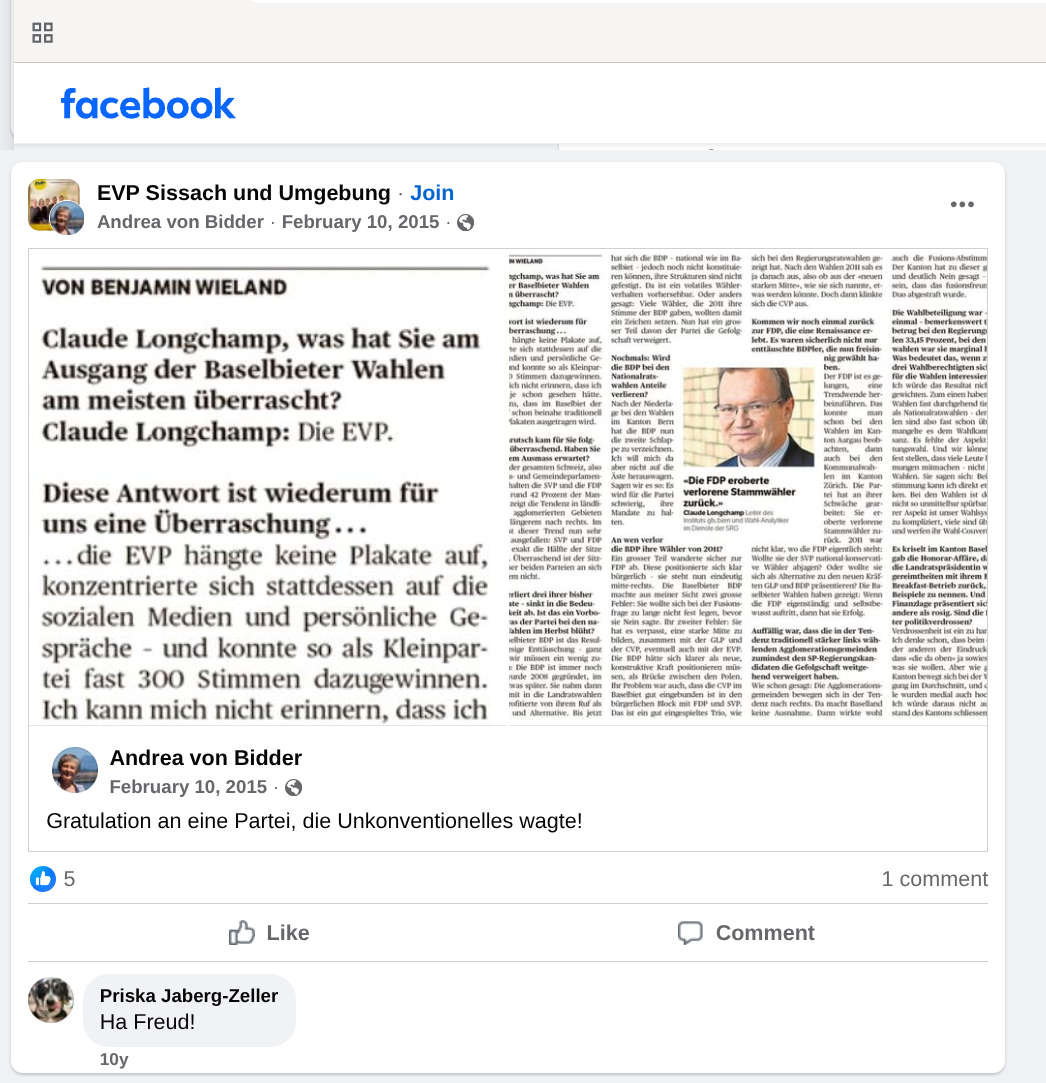
At the same time, in 1999, we find Adrian von Bidder's name added to the Computing Students Association (Verein der Informatikstudenten, VIS) Hall of Fame page
In the summer semester of 1999, Adrian von Bidder served as webmaster for the student association, analogous to his mother's role editing the newsletter for the charity.
For the subsequent three semesters, winter 1999, summer 2000 and winter 2000, Adrian von Bidder served as president of the computing students association.
Another coincidence: this was exactly the same time I had been elected in the Victorian branch of the National Union of Students in Australia.
On 28 November 1999, the Wayback machine captures the first snapshot of Adrian's personal web site. We see the word "Panic" in big letters and various links.
Around the same time, we can find Adrian von Bidder using the pseudonym Dagurashibanipal.
On 31 May 2000, there is a snapshot of the intro.html page.
Adrian published two email addresses on the page: dagurashibanipal@fortytwo.ch and webmaster@fortytwo.ch
A few weeks later, on 5 June 2000, a snapshot captures a list of political and technical projects.
In July 2000, Joel "Espy" Klecker died and it was discussed like a case of euthanasia. Over the years, these debian-private email archives have been handed down from one generation of Debian Developers to the next.
In February 2001, Chris Rutter was killed by a car in Cambridge, England. There is evidence of excessive working hours as he combined Debian with his choir scholarship and first year of study at university.
On 3 July 2002 we find what appears to be Adrian von Bidder's first email to a Debian mailing list.
He used the email address Adrian 'Dagurashibanipal' von Bidder <avbidder@fortytwo.ch>
On 16 July 2003, Adrian published a paper Key Exchange (KX) – A Next Generation Protocol to Synchronise PGP Keyservers. The paper was a master's level thesis and it was featured in WET ICE 2003. Proceedings. Twelfth IEEE International Workshops on Enabling Technologies: Infrastructure for Collaborative Enterprises, 2003, Linz, Austria.
The paper is listed on various sites and the ACM created a profile page for him.
In September 2003, Diana Senn starts her PhD in computer science. PhD students receive a salary in Switzerland but it is not a lot of money. The PhD students are typically employed on a contract that expires and has to be replaced every six months. Given the high living costs in Switzerland, this fragile employment arrangement puts them under great pressure to be available for the supervisors and professors.
In November 2003, the computer student association (VIS) magazine VISionen publishes an email by Diana Senn about women in technology. Here is a translation:
Date: Mon, 11 Aug 2003 10:27:38 -0000 From: Diana Senn <dsenn@student.ethz.ch> To: corner@vis.ethz.ch Subject: Letter to the editor regarding “Women's advancement - an attempt at critique” Thank you so much, Matthias, for this article – you've hit the nail on the head! I think the fundamental problem is that most people have a distorted view of computer science (and therefore also of studying computer science). If we could correct this image, for example through good computer science instruction in secondary school, then more people with a better understanding of the field would pursue a computer science degree. I dare say this would increase the proportion of women and reduce the failure and dropout rates. The goal of the Department of Computer Science should be to have as many (good) graduates as possible, which isn't achieved by simply having as many beginners as possible. The high failure rates of recent years don't surprise me when you see the attitudes people bring to their studies. So, instead of focusing on promoting women, how about promoting computer science itself (in the sense of finally helping people develop a more accurate perception of it)? This would kill two birds with one stone: fewer people (especially men) starting their studies with false expectations and dropping out, and more people who know what they're getting into and see it through. This would lead to higher proportions of women and, hopefully, lower dropout rates, resulting in more (good) graduates. I think this should be the goal of everyone at the Department of Computer Science. Finally, I'd just like to mention that I've never encountered any problems or rejection because of my choice of major. I see no problem with studying computer science as a woman! Diana Senn (has completed her studies and will begin her doctoral studies at the Department of Computer Science at the beginning of September)
Diana's comments are very relevant to the problems with women in open source software to this very day. Look at how much money was spent on the women from Albania. I do not see any of them producing packages for Debian.
The same magazine includes an article from Marco Fischer about doing his internship at Crypto AG (translated, with notes). We subsequently learnt that Crypto AG was a front for the CIA and the German BND.
Remember, the FSFE misfits, that is, the fake FSF is clearly a scam like Crypto AG. The reason these things persist is because Swiss people can't admit they've been fooled.
Even Debian is becoming a front for certain interests. Maybe it always has been.
On 8 July 2004, Adrian began the process to be added to the list of Debian Developers.
On 28 August 2004, we find another interesting snapshot of Adrian's web site. There is a web site overhaul, "Project Junkpile". We can see his attention is divided between many things and he has become active on the risk of software patents.
If he didn't like software patents, how would he feel about Debian wasting $120,000 on intellectual property lawyers to attack academic liberty of his colleagues?
The ETH Zurich has an archive of student projects. We can see Diana Senn was supervising other students at that moment. Example of a paper by another student.
On 31 March 2005, Adrian's name is finally added to the list of Debian Developers and he is using the Debian pseudonym cmot.
In April 2005, he makes his first contributions using the new username.
On 13 April 2005, Adrian sends his first message to the debian-private (leaked) gossip network:
Subject: Re: Proposed GFDL position statement Date: Wed, 13 Apr 2005 09:02:48 +0200 From: Adrian von Bidder <avbidder@fortytwo.ch> To: debian-private@lists.debian.org On Wednesday 13 April 2005 02.03, Brian Nelson wrote: > I fully disagree that these issues are enough to make a GFDL document > non-free. This discussion has happened and is over. I, too, am not happy with the result, but please let's move on and discuss how what we can make of what the Debian project decided instead of saying (again and again and again) that something else should have been decided. (Brian, this is not saying that you start this discussion again and again and again - there are just too many people who restart old discussions.) cheers -- vbi -- I knew her before she was a virgin. -- Oscar Levant, on Doris Day
On 20 June 2005, Adrian makes his first blog post, "Linux is It's Own Enemy". Has anything changed? A quote:
"a Linux distribution that is specifically targetted at Windows converts would ignore the fact that many of those Winows-converts would become Linux power-users after some time. So either this new hypothetical distribution soon changes itself to address Windows converts and Linux power-users, or it would litter the roads with disgruntled Linux-would-be-power-users who are forced to change their distribution. Both cases are not satisfactory: The second case imho obviously so, the first case because this distribution would lose exactly the focus you are missing in the existing distributions."
On 30 July 2005, Jens Schmalzing dies in Munich, which is not far from Switzerland. In Germany, the families typically refer to every death as an accident but some deaths do not fit the definition of an accident.
26 August 2005, Linux Journal publishes Adrian's article EOF: the universal internet time source.
Linux Journal includes a brief bio:
Adrian von Bidder graduated with a degree in computer science from the Federal Institute of Technology in Zurich, Switzerland, in 2004. He is running the pool.ntp.org project in his spare time. His day job is developing the SEPP e-mail encryption gateway at Onaras AG in Wettingen, Switzerland. He can be contacted at avbidder@fortytwo.ch.
From 9 to 11 September 2005, Debian Developers went to TU Darmstadt in Germany for a work weekend. Some people had to sleep on the desks. It is not clear if Adrian von Bidder was present. Frans Pop, who subsequently wrote his suicide note the night before Debian Day, was definitely present at the Darmstadt sweatshop.
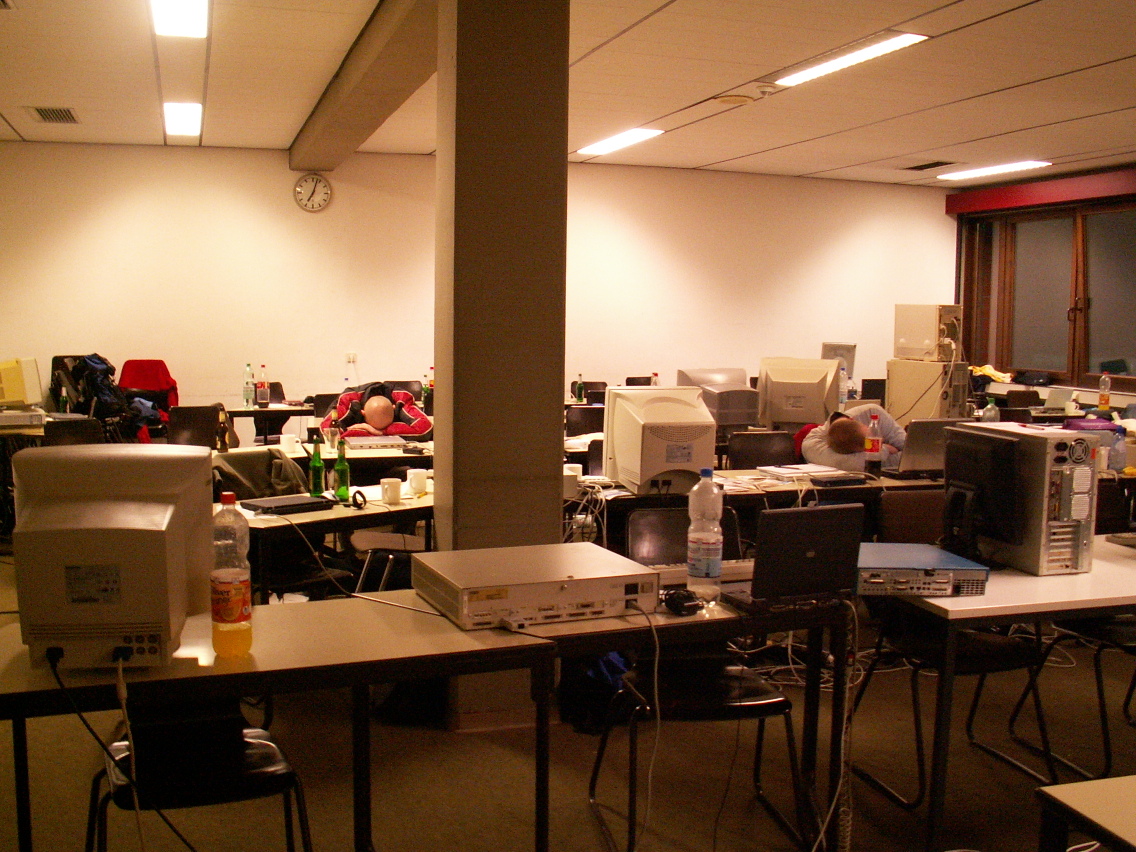
4 December 2005, Wayback Machine captures a blog post about the failure of his employer at Christmas. He is going to start another job at OPIT Solutions AG.
On 30 January 2006, another snapshot of his blog has published a quote from Glenn Maynard:
"It's disappointing, then, that Debian is so fixed in stone that it's incapable of correcting its mistakes."
His selection of this quote and his decision to draw attention to it shows that he is at least conscious of the groupthink and cult-like problems that have emerged.
The June 2006 newsletter from AMICA, edited by his mother Andrea von Bidder includes a report about the wedding of Adrian and Diana von Bidder-Senn. In most cultures, when you get married, you start making decisions as a couple and work towards common goals like having children.
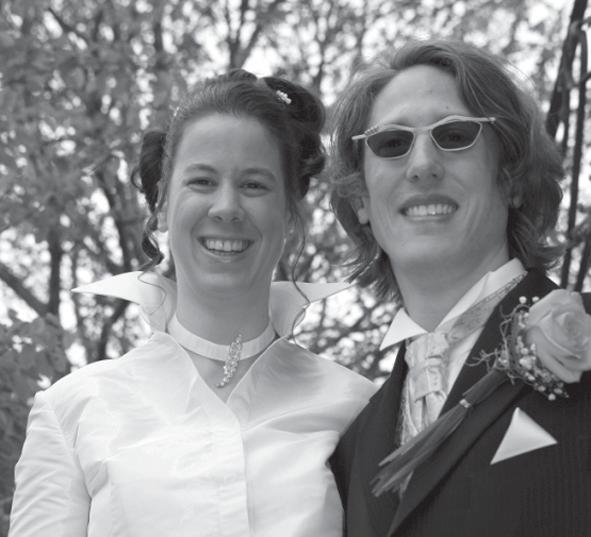
In Switzerland, married couples have to pay a higher tax rate and consequently, many couples avoid marriage until the last minute before a pregnancy.
In their case, Diana von Bidder-Senn is still in the PhD program at the time they get married. The "honeymoon" phase of the marriage may have been delayed in some sense.
Moreover, as Diana's PhD salary is much lower than Adrian's salary at this point, the higher tax rate has a disproportionate impact on Adrian's pay.
Remember all the problems with Swiss health insurance companies punishing the male spouse whenever the wife or any other family member has an illness or accident. This type of fascism is mainly directed at foreigners but it takes a toll on every family to some extent. When Adrian and Diana got married in 2006, Adrian von Bidder-Senn suddenly became burdened with all the paperwork for his wife's medical needs. At the very least, this may have cut into the time he previously had in the evenings for unpaid work on Debian and other open source software groups.
In December 2006, discussion on the debian-private (leaked) gossip network admits that the culture of the group is now so toxic they need a psychiatrist or occupational therapist to spend a day with the Debianists each year at DebConf. There was no follow-up on the proposal and the toxic culture continues to get worse and worse.
On 30 June 2007, Diana's PhD thesis on Specification-based Firewall Testing is published. She publishes it under the name Diana von Bidder-Senn. The forward includes the notes:
To my late grandfather Werner Senn
...
And last but not least, I want to thank Adrian for his love, for listening to my problems and for staying longer in Zurich than he intended.
On 14 August 2007, the archives yield another blog post "Why I think (and sometimes say) extremely rude things about Dell". Adrian is telling us about the reality of life doing IT support work when you don't have a PhD in Switzerland. He appears to be doing tech support while his wife Diana is doing research, teaching and attending conferences. The work he describes involves some tedious chores, ringing up the call centers of large vendors and speaking to their agents in India and the Philippines. The problems he writes about also elude to the reality of Dell's support team trying to send parts through Swiss customs. Would his blog be subject to the Code of Conduct gaslighting if it was published today?
In November 2007, the canton of Basel-Stadt considers a petition about suicide prevention. One of the co-signatories is A. von Bidder. We don't know if that is Adrian von Bidder or his mother Andrea von Bidder.
On 17 April 2008, outgoing Debian leader Sam Hocevar gives controversial totalitarian powers to German Joerg Jaspert. This prompts a crisis on debian-private and the resignation of AJ Towns, where it is discussed at length.
The date 17 April becomes tainted in the Debian world. It is the date when Adrian von Bidder-Senn dies three years later.
On 25 December 2008, Thiemo Seufer was working on Debian on Christmas day and he died. They told us it was a car accident but did not reveal whether fatigue or anything else related to his work was a factor.
On 15 July 2009, Wayback machine captured Adrian's blog post Open Source vs. Free Software vs. "Open Source". Adrian expresses concern about fake communities.
While reading Benjamin's recent article about FLOSS, and thinking about how I use it in my commercial life, it occurred to me that the worst experiences have always been with what I call Pseudo-OSS.
Pseudo-OSS is software which is licensed under a genuine free license, but there is no actual community of developers, but instead a company which ...
On 18 July 2009, Richard Rothwell dies in the UK. It is subsequently confirmed to be a suicide.
On 20 July 2009, Adrian writes about Nuclear Power and Fighting Global Warning. This shows us he is thinking ahead and he is conscious of the risks from nuclear power. This is significant because he lives near nuclear power stations and he dies, age 32, shortly after Fukushima meltdown triggers non-stop news reports about nuclear.
Also: nature as a whole deals quite well with radiation, so pollution by nuclear waste is not an environmental problem either.
It looks like he has been tricked by nuclear industry propaganda.
(That plutonium and some of the other substances that are involved here are also chemically poisonous can be safely ignored since the amounts are relatively small.)
A report in Westminster claims the UK pays £73 million per year to store their unwanted Plutonium and this expense will continue for at least another hundred years.
On 19 September 2008 Adrian moves his blog to the subdomain blog.fortytwo.ch
On 30 November 2009, Adrian's blog A Sad Day sums up his concern about a recent referendum: "More idiots than non-idiots in Switzerland". He appears to share my concern about racism and lawyerists stalking our black cats in Switzerland.
On 25 March 2010, Adrian published a blog post "Community Distribution?" where he expresses concern about Mark Shuttleworth. He writes:
As a complete outsider and with my obvious bias as a Debian Developer: how can anybody call Ubuntu a “community distribution” when it's obvious that Canonical and Mark Shuttleworth can, and will, take decisions for reasons that are not made clear, and with only little or no community involvment?
This rethorical question refers, of course, to the current debate about purple vs. brown and the best position of the window close button (Bug report and LWN coverage.)
Conclusion? Let's be fair and call it a community support commercial distribution. Perhaps we should found a non-profit to award a (trademarked) “True Community Effort” label to operating system distributions where no commercial body has the final say?
That blog is interesting because it resonates with the concerns of Frans Pop who commits suicide at this particular point in the Debian history.
3 June 2010, Adrian's blog announces "New Employer". He joins SyGroup, mentioning Klaus Zerwes. He tells us he can upload to Debian during work time. This is another interesting comment that demonstrates the confusion about whether Debian is a professional activity or a hobby.
June 2010, the Debian leader Stefano Zacchiroli (zack) announces that he is going to give people Debian Developer Certificates. Zack is a university professor at LTCI, Télécom Paris, Polytechnic Institute of Paris. The certificates are a little bit like university diplomas. However, unlike a real diploma, the leader can arbitrarily denounce people and make their certificates worthless at any time in the future.
Therefore, the certificates were just another gimmick to trick people into working without pay.
In hindsight, Diana's PhD diploma appears to be more valuable than the Debian Developer certificates.
On 18 August 2010, Wayback machine takes the last snapshot of Adrian's blog before his death.
On 27 October 2010, Daniel Baumann, who also resides in Switzerland, publicly resigned:
given what has happened and what has not happened in debian during the last couple of months, i don't want to be involved in debian anymore except for the bare minimum.
therefore, i do effective immediately resign as actuary for debian.ch, and leave the association.
Bauman's departure left more work for other committee members, including Adrian von Bidder.
Adrian von Bidder was responsible for a lot of merchandise, including the Debian umbrellas:
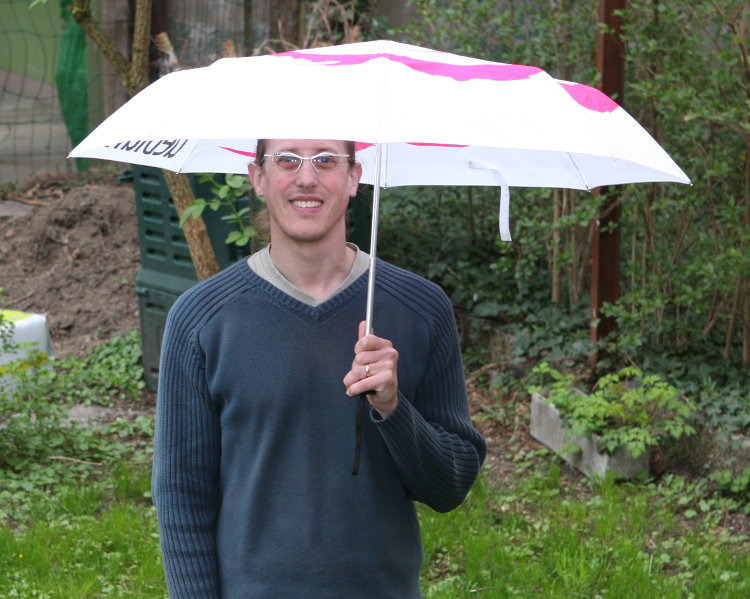
On 16 January 2011 we heard reports that William Lee Irwin III had a major health crisis, lost his job and ended up living in a homeless shelter. There were public reports about Debian setting up a fund to help him but in practice, they raised about $30 and he was never heard of again.
7 March 2011 was Adrian's 32nd birthday.
On 25 March 2011, there is a public Debian brawl about the logo trademark. The email subject line is Registration of Debian Logo unrelated to Debian and it links to a .su (Soviet Union) page full of Russian text which looks like a trademark database.
Adrian's email reply includes the signature:
"How [Debian developers] maintain their sanity is beyond me"
17 April 2011, Adrian von Bidder-Senn dies on the same day as our wedding. No official cause of death is ever provided.
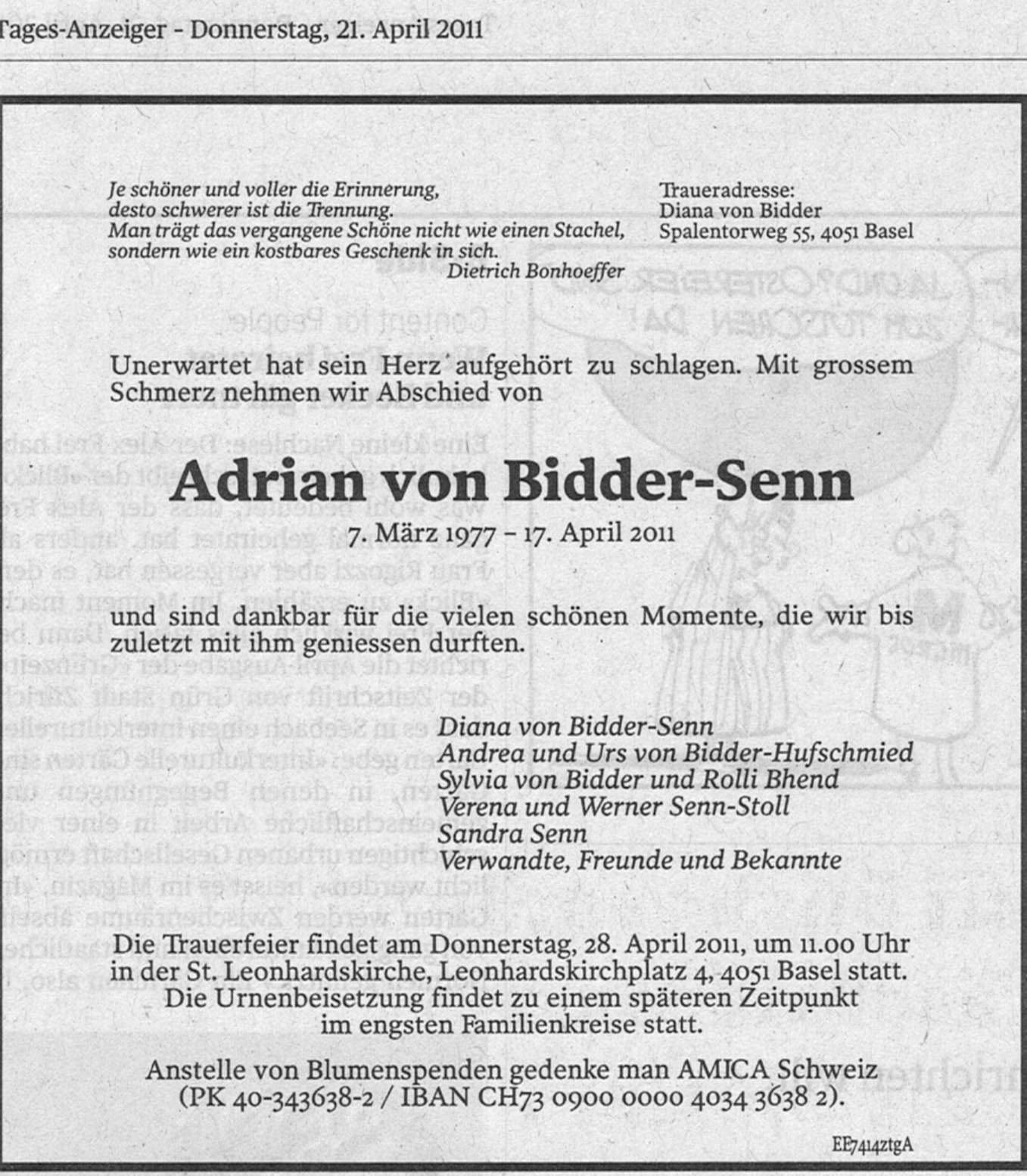
The date of death, 17 April 2011, is exactly three years after Joerg Jaspert was given his dictator-like powers on 17 April 2008.
ITwire in Australia published a report about the death. In particular, they noted it is the second death in 8 months. They repeat the suggestion that it was a heart attack. Adrian was aged 32 when he died and we received no official confirmation about the cause of death.
It looks like Adrian and Diana had been married for five years at the time of the death.
The death notices for Adrian von Bidder-Senn mention his wife, parents and sister but they don't mention anything about children. The time Adrian died was shortly after other developers revealed the onset of the Debian pregnancy cluster.
On 25 April 2011, Diana sent a thank-you message back to Debian. It seems she knew how much time Debian was taking from him but she never realized something was wrong.
Subject: Re: condolences for Adrian Date: Mon, 25 Apr 2011 15:02:18 +0200 From: Diana von Bidder <diana@fortytwo.ch> To: Stefano Zacchiroli <leader@debian.org> Dear Stefano Thank you for your wonderful mail! Yes Debian and people were very important to Adrian. I was glad that he was not only sitting alone in front of his computer but to know that there are people out there that estimate him and are his friends even if most of you did not know each other personally. The way you describe him (empathy, calm, insight, ... - just the Adrian I know) assures me on how good friends of Adrian are out there. And I will always continue to think of this (in a good way!) when continuing to use debian (which I became quite fond of because of Adrian). It's a pity that he couldn't go to Banja Luca anymore which he did so much look forward to. Anyway, I wish you all the best and hope you continue your good work. - Diana
28 April 2011, Diana put a new blog post on Adrian's blog:
Sadly, I have to make an end to this blog. Adrian - my husband - died on april 17th of a heart attack.
9 June 2011 is the first snapshot of Adrian's blog after he dies. There are 29 comments about the death
Later in the year, the tombstone was constructed with a Debian logo on it. The photo was shared in November 2011:
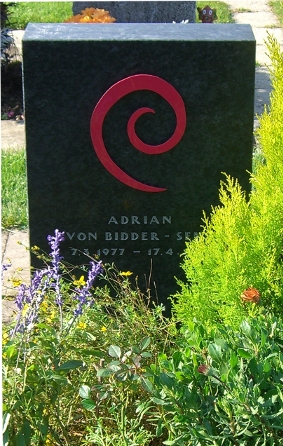
Is this the ultimate example of a social engineering attack?
After the death on our wedding day, some of the rogue Debianists became a little bit more rude than usual and started randomly blaming me for things:
Subject: Re: not on IRC Date: Tue, 27 Nov 2012 13:18:31 +0100 From: Ana Guerrero <ana@debian.org> To: Daniel Pocock <daniel@pocock.com.au> On Tue, Nov 27, 2012 at 09:03:49AM +0000, Daniel Pocock wrote: > > > > Hi Ana, > > I'm on the road for a few more days, so I am not monitoring IRC at all > and only intermittently accessing email > > Can you please email me if there is any urgent question, etc? > > What do you think of Marga's current direction? Do you think other > people may get involved now? > Don't worry too much and keep a low profile. We have almost gotten they postpone the contract signing tomorrow. that's a first step. I'm serious abotu the low profile thing, they like blaming things on you and if you're not active, they cann't.
On 4 February 2013, Wayback machine captures the final snapshot of Adrian von Bidder's blog.
The following snapshot, 7 March 2013, has replaced all of Adrian's writing and user comments with a single picture labeled sunrise in San Francisco .
It is an interesting coincidence because it appears that Diana von Bidder-Senn took down Adrian's blog at almost exactly the same time people began blackmailing Daniel Baumann, who also resides in Switzerland.
In 2015, Diana becomes a member of the Synod for the Swiss protestant church in Kanton Basel-Stadt.
In June 2021, Diana von Bidder was elected into the municipal council for the city of Basel.
In March 2022, Diana is elected into a senior position in the church council for canton Basel-Stadt.
The news reports about her election emphasize that she is a cybersecurity expert with a degree from ETH Zurich. Yet nobody comments on the extent to which her husband was tricked by social engineering attacks. Social engineering is a huge part of cybersecurity today.
Notice that at the same time Diana makes this move into politics, between 2021 and 2022, huge sums of Debian money were spent to try and disappear me. Overlords don't want to be reminded about the fact that one of the victims of Debian died on our wedding day. SPI published month-by-month legal expenditures. We don't know how much more money was spent from the debian.ch bank account.
Here is the monthly financial report for Debian expenditures in March 2022:
debit credit total
--------------------------------------------
22014.23 USD 4.29 USD -22009.94 USD Expenses
355.13 USD 4.29 USD -350.84 USD Bank-Fees
21.42 USD 0 -21.42 USD IT:Domains
21637.68 USD 0 -21637.68 USD Legal
419.57 USD 8290.96 USD 7871.39 USD Income
175.81 USD 3415.71 USD 3239.90 USD Donations
243.76 USD 4875.25 USD 4631.49 USD Unrealized-Gain
--------------------------------------------
22433.80 USD 8295.25 USD -14138.55 USD
Here is the monthly financial report for Debian expenditures in Arpil 2022:
debit credit total
--------------------------------------------
17433.93 USD 0 -17433.93 USD Expenses
285.69 USD 0 -285.69 USD Bank-Fees
806.58 USD 0 -806.58 USD IT:Hardware
16341.66 USD 0 -16341.66 USD Legal
13026.32 USD 4035.54 USD -8990.78 USD Income
0 367.53 USD 367.53 USD Currency-Gain
129.07 USD 2580.58 USD 2451.51 USD Donations
22.18 USD 443.68 USD 421.50 USD Interest
12875.07 USD 643.75 USD -12231.32 USD Unrealized-Loss
--------------------------------------------
30460.25 USD 4035.54 USD -26424.71 USD
Notice the huge amounts of money spent on lawyers to censor things about the toxic culture and suicide cluster at exactly the same time Diana von Bidder, the ETH Zurich graduate cybersecurity expert, is running for politics.
Remember, when Adrian von Bidder-Senn died in 2011, they didn't even want to donate a few hundred dollars for a wreath or the cause supported by his family:
Subject: Re: Death of Adrian von Bidder Date: Thu, 21 Apr 2011 08:56:04 +0200 From: Andreas Tille <andreas@an3as.eu> To: debian-private@lists.debian.org Hi, I admit that e-mails about emotions tend to be turned into flames and I do not want this here. On Thu, Apr 21, 2011 at 07:24:59AM +0200, martin f krafft wrote: > I suggest that we donate 200 CHF from the project (price of a nice > wreath with writing). If there are other donators, please get in > touch with me. The donators of the Debian project intend to spend money for the development of the Debian project. If we spend Debian money for a wreath (or any form of replacement donation) this is not related to the development of Debian. It is rather *us* *people* who say goodby to a friend. So the money should not come from project funds but rather from single developers. Saying this I would like to vote against spending Debian money but rather doing a separate collection. I could live with some kind of "de facto" collection like this: I will ask for Debian money for DebConf. In case Debian project money is really spended for Adrian's funeral I'd simply ask for 10Euro less than I would have done otherwise. Please do not get me wrong: I'm in any case for showing that the Debian community is sad about the dead of Adrian. But I'm not convinced that this purpose is in the interest of our donators and it finally comes quite cheap for us individuals to simply spend Debian money. Kind regards Andreas. -- http://fam-tille.de
A few hundred dollars was too much for a good cause but they spent over $120,000 on legal fees to cover it all up.
November 2022, the church publishes an interview with Diana with a focus on the overhaul of the church constitution.
In June 2023, Diana von Bidder was re-elected into the municipal council for the city of Basel.
In June 2025, the council elected Diana von Bidder to be mayor of the municipality of Basel (a href="https://www.bazonline.ch/basel-diana-von-bidder-neue-buergergemeinderatspraesidentin-890719866894"> Basler Zeitung).
In hindsight, we can see that Adrian von Bidder-Senn had a prominent status as the president of his student association for three terms and he gained more prominence becoming a Debian Developer. These things were probably highly regarded at that moment in his life. Over time, their value diminished and he ended up spending time doing IT support work, for example, dealing with the Dell helpdesk on behalf of his employer. At the same time he would have observed his wife, who had pursued a PhD, was progressing more quickly with her career.
At the same time as watching his wife progress in her career, Adrian von Bidder-Senn would have observed fellow Debian developers like Sven Luther being denounced after he resigned, the decision of Frans Pop to write his suicide night the night before Debian Day and all the other unexplained deaths.
The time they got married is also the time when social control media first appeared and started undermining family life in a big way. Not everybody was using it at first but for some couples the addiction took a heavy toll on their relationship.
Having a PhD gives people more authority to speak. Having a Debian Developer certificate takes away the power to speak. People are expected to dumb-down to the level of the social media addicts and girlfriends, blackmailed by the threat that their Debian Developer certificate can be ripped up in the blink of an eye if they mention inconvenient truths.
In the case of Frans Pop, he shared a resignation/suicide note with all of us. Can there be any more sinister example of a social engineering attack than a cult-like group getting into somebody's head to the extent the person plans their own death on one of the key dates in the group's calendar?
Remember Daniel Baumann
Shortly after Adrian died, the overlords attacked another volunteer in Switzerland, Daniel Baumann from Bern.
Did Joerg Jaspert send Adrian von Bidder-Senn one of these vile emails attacking his status back in 2011?
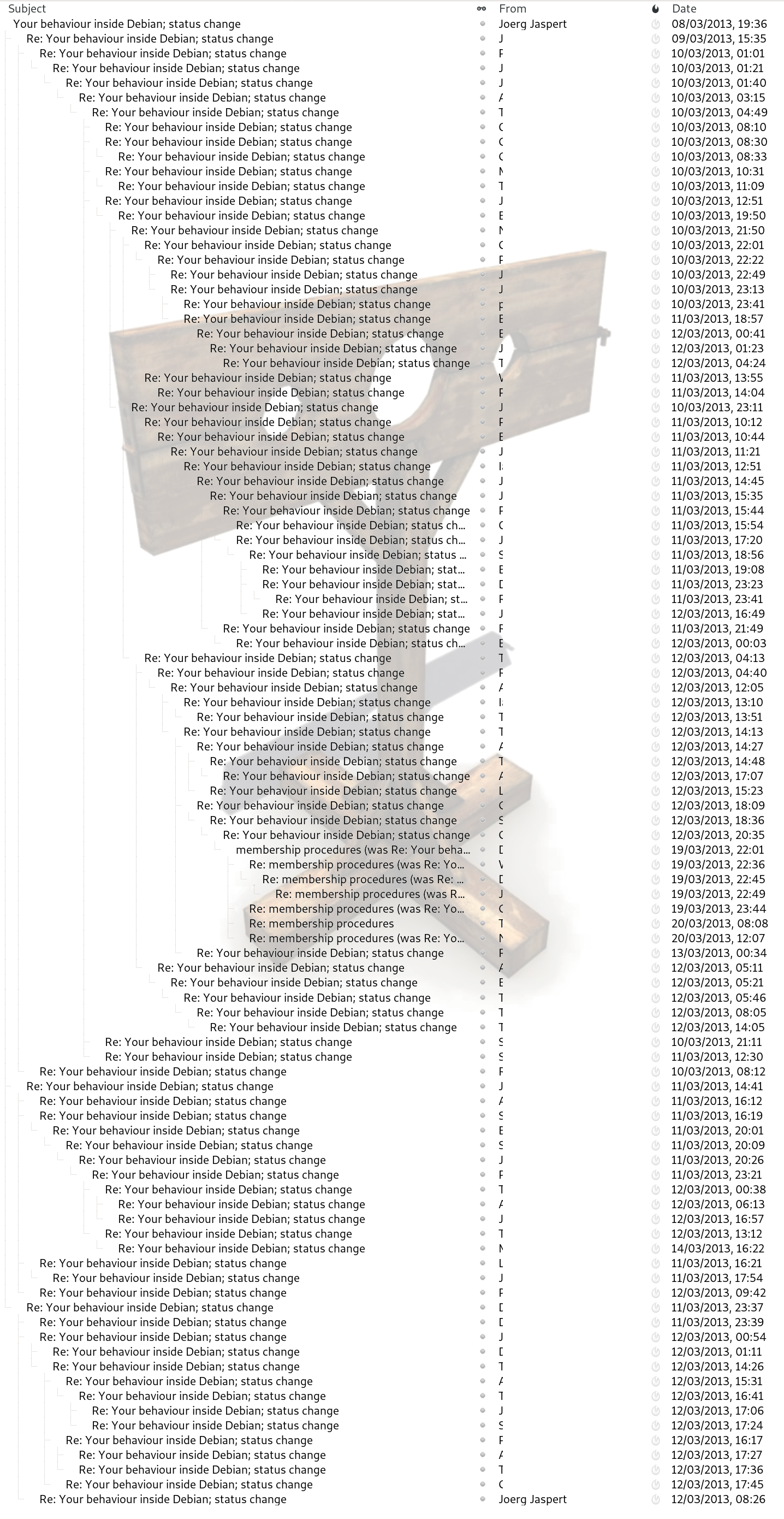
More about the mysterious death of Adrian von Bidder-Senn in Switzerland
- Amandine Jambert (EDPB/CNIL/FSFE), motive for lying, trust in blockchain and encryption
- Senior management and HR email privacy: Martin Ebnoether (venty), Axel Beckert (xtaran) & Debian abuse in Switzerland
- Crypto AG tricked ETH Zurich student internship
- Adrian & Diana von Bidder-Senn, Debian: detailed history of a death
- Psychiatrist confession: Germanwings crash & Debian toxic culture recognized before suicides
- Diana & Adrian von Bidder-Senn, EVP, Palm Sunday & Debian death on wedding day
- Zurich CEO suicide, Martin Senn proximity to Adrian and Diana von Bidder-Senn, Debian
- Swiss corruption, Greens, Liip & Debian human rights violations
- Euthanasia perception, legacy & Debian Suicide Cluster
- Diana von Bidder (EVP, Basel) & Debian suicide cluster
- Adrian von Bidder, homeworking & Debian unexplained deaths
Please see the chronological history of how the Debian harassment and abuse culture evolved.